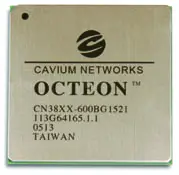| Cavium OCTEON | |

| |
| CN38xx | |
| Developer | Cavium |
| Manufacturer | TSMC |
| Type | System on chips |
| Introduction | September 13, 2004 (announced) June 1, 2005 (launch) |
| Architecture | MIPS64 R2 network SoCs |
| ISA | MIPS64 |
| µarch | cnMIPS |
| Word size | 64 bit 8 octets
16 nibbles |
| Process | 130 nm 0.13 μm
1.3e-4 mm |
| Technology | CMOS |
| Clock | 400 MHz-600 MHz |
| Package | FCBGA-1521, HSBGA-868 |
| Socket | BGA-1521, BGA-868 |
| Succession | |
| → | |
| OCTEON II | |
OCTEON was a family of 64-bit multi-core MIPS microprocessors designed by Cavium for networking devices.
Contents
Overview
The original OCTEON family of network-oriented microprocessors were announced in September of 2004. These chips are based on Cavium's newly announced microarchitecture, cnMIPS, announced the same day. The cnMIPS design is a fully compliant MIPS64 revision 2 implementation. OCTEON chips are found in many enterprise an data center network servers, routers, and switches as well as various high-end residential routers.
Architecture
- Main article: cnMIPS µarch
The cnMIPS microarchitecture is a fully-custom design implementing the MIPS64 revision 2 ISA on TSMC's 130 nm process. Due to the specific nature of the applicatons running, an FPU was omitted. Instead, Cavium opted to incorporate a wide array of hardware accelerators for network applications (L3 to L7) including support for compression/decompression algorithms (e.g.GZIP), and security/crypto algorithms (e.g. DES, AES, MD5, and SHA1).
Members
| This section is empty; you can help add the missing info by editing this page. |
Datasheet
| designer | Cavium + |
| first announced | September 13, 2004 + |
| first launched | June 1, 2005 + |
| full page name | cavium/octeon + |
| instance of | system on a chip family + |
| instruction set architecture | MIPS64 + |
| main designer | Cavium + |
| manufacturer | TSMC + |
| microarchitecture | cnMIPS + |
| name | Cavium OCTEON + |
| package | FCBGA-1521 + and HSBGA-868 + |
| process | 130 nm (0.13 μm, 1.3e-4 mm) + |
| socket | BGA-1521 + and BGA-868 + |
| technology | CMOS + |
| word size | 64 bit (8 octets, 16 nibbles) + |